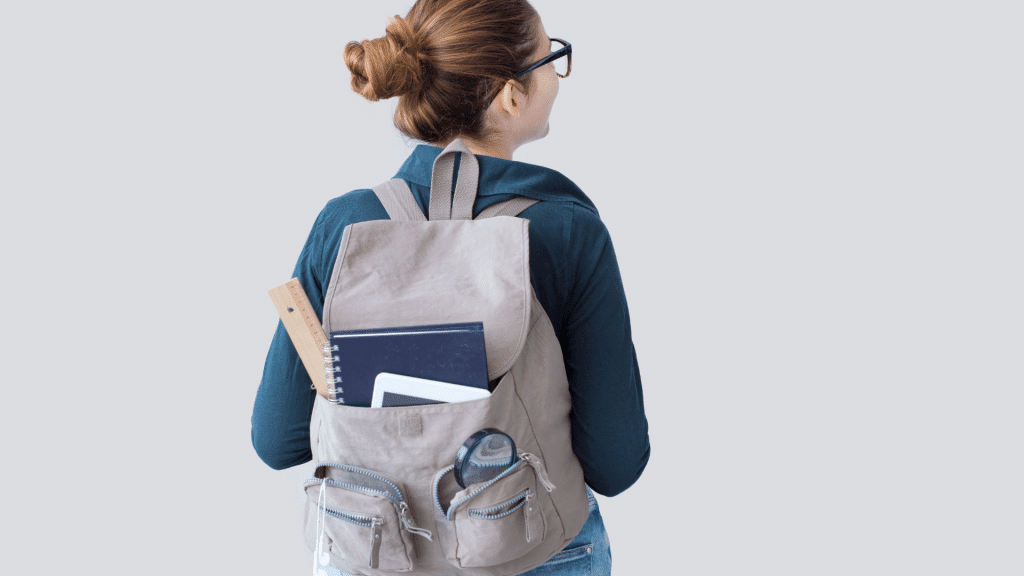
How much does backpack weigh? You might carry much more than you should if you are a student. According to the American Chiropractic Association, you should not carry over 10% of your body weight. The average middle school girl weighs 82.5 pounds, and the average middle school boy weighs 85 pounds. This means that the maximum weight of the backpack should be 8.25-8.5 pounds. If you are a high school student, you should not carry more than 10-15% of your body weight.
The average weight of a backpack depends on the age of the student. The average weight of a kindergarten student’s backpack is 5 pounds. The average weight of a fourth-grader’s backpack is 18.4 pounds. The average weight of a seventh-grader backpack is 18.4 pounds. The average weight of a high school student’s backpack is 14.6 pounds.
Choosing the right backpack is a crucial decision that can greatly impact your comfort and convenience while on the go. One important factor to consider when selecting a backpack is its weight.
Understanding how much a backpack weighs and how that weight will affect your overall experience is key to finding the perfect fit for your needs. In this blog post, we will delve into the question, “How much does backpack weigh?” and provide valuable tips to help you choose the ideal backpack that aligns with your requirements and preferences.
This article will discuss how much weight is appropriate for different backpacks and how to choose the right backpack for your needs.
Importance of Considering How Much Does Backpack Weighs
The weight of your backpack is an important consideration when choosing the perfect backpack for your needs. The weight of your backpack can impact your comfort, energy levels, and even your ability to hike safely. Wondering about the specific weight you can expect? Let’s explore: how much does backpack weigh?
This guide will discuss the ideal backpack weight for different hiking trips. We’ll also provide tips for choosing a backpack that will help you keep your load as light as possible.
Understanding Backpack Weight
Backpack weight is critical when deciding which backpack is best for you. The weight of the backpack itself is called the pack weight. This is different from the base weight, which is the weight of the backpack and all of the gear inside it, minus consumables like food and water.
A good rule of thumb is to keep your base weight under 20% of your body weight. This will help you avoid carrying a backpack that is too heavy for you.
Factors Affecting the Weight of a Backpack – Average Weight Range for Different Types of Backpacks
Daypacks are usually designed to be lightweight and comfortable. These packs are perfect for short day hikes and trips where you don’t need to carry much gear. Most daypacks weigh between 1-2 pounds.
Hiking Backpacks

Hiking backpacks are designed for long hikes and can be used for everything from day hikes to multi-day camping trips. These packs are designed to comfortably carry and distribute your gear’s weight evenly.
When considering which hiking backpack to purchase, one common question that arises is, ‘how much does backpack weigh?’ Understanding the weight of your backpack is crucial for planning your hiking adventures and ensuring you can comfortably carry it throughout your journey.
Hiking backpacks come in a variety of sizes, measured in liters. A 20-30 liter pack is a good size for a day hike, while a 30-50 liter pack is better for an overnight trip. If you’re going on a multi-day hike, you’ll want a pack that’s 50 liters or larger.
Some hiking backpacks have a built-in water reservoir or hydration system, so you can drink water without stopping and removing your pack. If you’re going to be hiking in hot weather, this can be a great feature.
Travel Backpacks
Travel backpacks are designed to hold a lot of gear and be comfortable. These backpacks are great for long trips, especially if you spend time in different places and move around a lot.
They are also good for people who prefer backpacks to rolling luggage. When choosing the perfect travel backpack for your adventures, one important consideration is, ‘how much does backpack weigh?’ Knowing the weight of your backpack is essential for ensuring you can easily carry it throughout your travels without feeling weighed down.
Travel backpacks come in several styles, including convertible, carry-on, and trekking. Convertible travel backpacks have wheels and a handle for rolling luggage. Carry-on travel backpacks are designed to fit the maximum carry-on bag size, so you can avoid checking your luggage. Trekking travel backpacks have extra support and padding, making them more comfortable for long periods.
Importance of Choosing the Right Weight

If you’re a beginner, you may not realize why choosing a lightweight backpack is important. But trust me, you’ll be glad you did later on.
The weight of your backpack can greatly affect your posture and your stamina. It can also affect your ability to maneuver through different terrains. The lighter your backpack, the easier it will be to carry and the less likely you are to suffer from back pain.
Therefore, when preparing for your outdoor adventures, it’s essential to ask yourself, ‘how much does backpack weigh?’ Understanding the weight of your gear can help you make informed decisions and ensure a more comfortable hiking experience.
However, ensuring your backpack isn’t too light is also important. A backpack that is too light can be less stable and more likely to tip over. It can also make it more difficult to pack and organize your gear.
Benefits of Lighter Backpacks for Long-term Usage

The backpack weight will be the most significant factor in determining the overall weight of your pack. The average weight of a backpack will vary based on the size and capacity of the backpack. However, the average weight of a backpack is about 2 to 5 pounds. Understanding how much does backpack weigh is crucial for selecting the right pack for your needs and ensuring a comfortable hiking experience.
That being said, you can find backpacks that are lighter or heavier than this standard. The weight of your backpack will also vary based on the type of backpacking you plan to do.
For example, if you are going on a multi-day backpacking trip, you will need a larger backpack, which will be heavier. On the other hand, if you are going on a short day hike, you will only need a small backpack, which will be lighter.
Tips for Choosing the Perfect Backpack Weight
When it comes to choosing the perfect backpack weight, there are a few things you should keep in mind. First, consider what you will be using the backpack for. If you carry a lot of gear, you may want to choose a heavier backpack. If you use the backpack for short trips, you may want to choose a lighter backpack.
You should also consider the weight of the backpack itself. Some backpacks are heavier than others, which can make a big difference in how comfortable the backpack is. Look for a backpack made with lightweight materials, and try to avoid backpacks with many extra features, as these can add to the weight.
When assessing your options, it’s essential to inquire, ‘how much does backpack weigh?’ This knowledge will guide you toward selecting a backpack that suits your needs while ensuring optimal comfort during your outdoor adventures.
Finally, consider your own physical strength. If you are in good shape, you can carry a heavier backpack without problems. However, if you are not used to carrying much weight, you may want to start with a lighter backpack and work up.
Consider Your Needs

Whether going on a short day hike or a multi-day adventure, choosing a backpack that’s the right size for the gear you need to carry is important.
Day Hiking: For a day hike, you’ll need a large backpack to carry water, food, and extra clothing. For most day hikes, a 20-30 liter backpack is usually the right size. When selecting your day hiking backpack, it’s important to consider not only the size but also the weight. You might ask, how much does backpack weigh?’ Ensuring a comfortable weight can enhance your hiking experience and prevent unnecessary strain on your shoulders and back.
Overnight Backpacking: For an overnight trip, you’ll need a large backpack to carry a sleeping bag, shelter, food, and extra clothing. A 30-50 liter backpack is usually the right size for an overnight trip.
Multi-Day Backpacking: You’ll need a large backpack to carry all the gear you need for a multi-day trip. A 50-70 liter backpack is usually the right size for a multi-day trip.
Long-Distance Backpacking: For a long-distance hike, you’ll need a large backpack to carry all the gear you need and enough food to last you between resupply points. A 60-80 liter backpack is usually the right size for a long-distance hike.
Travel: You’ll need a large backpack to carry your clothing and other essentials. A 30-50 liter backpack is usually the right size for travel.
Different Purposes Require Different Backpack Weights
Different backpacks have different functions, and the purpose of your backpack will significantly affect how much it weighs.
The most common purpose for a backpack is for everyday use. These are your average school and work backpacks, and they are designed to carry a moderate amount of weight. These backpacks typically weigh between 1 and 2 pounds.
If you are looking for a backpack for a short hike, a day pack or a small travel backpack is a great option. These backpacks are designed to carry moderate weight and are typically very lightweight. When considering which backpack to choose, it’s helpful to inquire about the weight, asking, how much does backpack weigh? Ensuring a lightweight option can enhance your comfort and mobility during your short hiking adventures.
Day packs and small travel backpacks typically weigh between 1 and 3 pounds.
Material Choice
The material your backpack is made of will greatly impact how much it weighs.
For example, a backpack made of canvas will be heavier than a nylon backpack.
The trade-off is that canvas is more durable and will last longer than nylon.
If you’re looking for a lightweight backpack, consider one made of ripstop nylon.
This material is lightweight but still very durable.
Recommendations for Lightweight Yet Durable Materials
The weight of your backpack will impact your ability to carry it. If a backpack is too heavy, it can cause discomfort and pain in your shoulders and back and can even lead to injury. On the other hand, if a backpack is too light, it may not provide enough support for your gear and can be less durable.
Therefore, when selecting a backpack, it’s essential to consider its weight and ask, how much does backpack weigh? This ensures you find a balance between comfort, support, and durability for your outdoor adventures.
The best way to determine how much your backpack should weigh is to consider the weight of your gear and the length of your trip. If you plan to carry a lot of gear and will be out for an extended period, you may need a more supportive and durable backpack, which may weigh more.
If you plan to carry less gear or will be out for a shorter period, you may be able to get away with a lighter backpack.
Importance of Trying on and Testing the Weight of a Backpack Before Purchase
You will carry your backpack for long periods if you are a hiker, camper, or backpacker. You must test the weight of your backpack before you purchase it. Knowing how much does backpack weigh is crucial for ensuring it aligns with your comfort and endurance levels, ultimately enhancing your outdoor experiences.
By doing so, you can make necessary adjustments to the straps and hip belt for a comfortable fit. If you don’t, you may have shoulder and back pain, which can ruin your enjoyment of the great outdoors.
As a general rule, you will want to try on the backpack and add about 10-15 pounds of weight to it to get a sense of how it will feel when fully loaded.

Encouragement to Prioritize Backpack Weight When Choosing One for Your Needs
If you’re looking to buy a backpack for a specific purpose, consider the backpack’s weight a top priority. If you’re just looking for a backpack for everyday activities, you should consider the backpack’s weight, but you can also focus on other factors. When making your decision, don’t forget to ask, how much does backpack weigh? Understanding the weight can help ensure you select a backpack that suits your needs and preferences.
We’ll talk about other factors to consider when choosing a backpack, but first, let’s get into the importance of backpack weight.
Want to Reach the Right Audience in Just Seconds?
With backpacks designed for hiking, the backpack weight is not a significant concern for most people. Most people can carry a backpack that is 20% of their body weight. However, some people may be able to carry more, while others may carry less.
A 20% body weight backpack is a good starting point for most people. However, it is not a hard and fast rule. The best way to determine the right weight for your backpack is to try it on and see how it feels.
If you are planning a long hike, you may want to consider a lightweight backpack. These are designed to be as light as possible while providing the necessary storage space and features.
Most of us have heard the adage “weight is weight” when it comes to working out, but the weight you carry on your back is important. When it comes to backpacking, you may not have a choice in the amount of weight you carry with you, but you can choose the weight of your backpack.
The weight of your backpack is important to consider, especially if you are new to backpacking. A lighter backpack will allow you to carry more weight without feeling as though you are overburdened. It will also allow you to cover more miles in a day.
Backpacking gear is expensive, and it can be tempting to skimp on the weight of your backpack to save money. However, a heavy backpack can lead to back pain and discomfort, ruining your trip.
Conclusion
In conclusion, we have explored the question “How much does backpack weigh?” and provided valuable insights into the factors that can influence the weight of a backpack. Understanding the weight of your backpack is crucial for ensuring comfort and convenience during your travels or daily commutes. You can make informed decisions when selecting the perfect backpack by considering your backpack’s material, size, and contents. Remember to prioritize functionality and comfort while keeping weight in mind. Thank you for reading, and we hope this information helps you choose the ideal backpack for your adventures.
FAQs
Q: How much does a standard backpack weigh?
A: The weight of a standard backpack can vary, but on average, it can weigh anywhere from 1 to 4 pounds.
Q: What factors can affect the weight of a backpack?
A: The weight of a backpack can be influenced by its size, material, design, and the items you choose to carry in it.
Q: Is there an ideal weight for a backpack?
A: The ideal weight for a backpack depends on your comfort and the activities you plan to engage in. It’s important to choose a weight that feels manageable for you.
Q: How can I reduce the weight of my backpack?
A: You can reduce the weight of your backpack by choosing lightweight materials, packing only essential items, and investing in compact, multi-purpose gear.
Q: Are there backpacks specifically designed to be lightweight?
A: Yes, some backpacks are designed with lightweight materials and minimalistic features to reduce overall weight.
Q: What is the average weight of a hiking backpack?
A: The weight of a hiking backpack can vary depending on its size and capacity, but it typically ranges from 2 to 5 pounds for daypacks and 4 to 7 pounds for larger packs.
Q: Can the weight of a backpack impact my posture and comfort?
A: A heavy backpack for extended periods can strain your posture and lead to discomfort. Distributing the weight evenly and adjusting for a comfortable fit is important.
Q: How can I weigh my backpack?
A: You can weigh your backpack using a regular luggage scale or by comparing it to known weights like bags of sugar or flour.
Q: Are there regulations for backpack weight in certain activities or organizations?
A: Some outdoor activities, such as backpacking and hiking, may have recommended weight limits for safety and comfort. Additionally, certain organizations or events may have specific guidelines for backpack weight.
Q: What should I do if my backpack feels too heavy?
A: If your backpack feels too heavy, consider reevaluating your packing list and removing non-essential items. It’s also helpful to adjust the straps and distribute the weight evenly to alleviate discomfort.